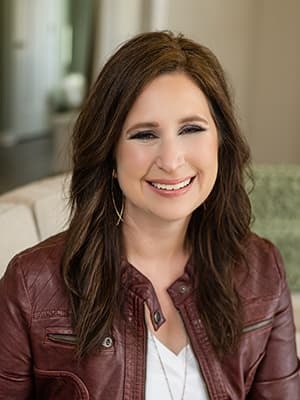
April 8 is a day that will always haunt Jen Stanbrough. On that day in 2011, Stanbrough, a managing broker at RE/MAX Precision in West Des Moines, Iowa, was showing a home when her phone began buzzing constantly. She excused herself from her client to answer the call, and a colleague on the other end of the line spoke the chilling words Stanbrough will never forget: “Ashley was shot during an open house.”
Her dear friend Ashley Okland, a 27-year-old agent, had been shot twice while working at a model home in an area of town that was thought of as a safe community. Police have never found a suspect in her death. Her homicide captured national headlines and thrust real estate safety into the spotlight, prompting her local REALTOR® association to action.
Stanbrough keeps Okland’s story alive to warn other real estate professionals about the dangers they potentially face in the field. “It can happen to you, to one of your friends, a colleague, or family member,” Stanbrough told attendees at a safety webinar on Sept. 23. “I don’t tell you that to scare you; I want you to be prepared.” The webinar, “Selling Safely: Because It Can Happen to You,” garnered 1,544 attendees—a record number and more than double the average attendance for the National Association of REALTORS®’ safety webinars.
Stanbrough became a founding member of the Des Moines Area Association of REALTORS®’ Safety Committee following Okland’s death. She shared safety tips during the webinar, which coincided with REALTOR® Safety Month, a campaign every September to remind real estate pros to take safety precautions on the job. Such steps are important because one-third of REALTORS® say they have feared for their personal safety at some point during the course of their work, according to NAR’s 2020 Member Safety Reportpdf. Practitioners express feeling the most vulnerable when meeting with unknown clients at vacant properties, holding open houses, and conducting showings, the report shows.
Here are some of Stanbrough’s tips for staying safe.
- Pledge to follow best practices. Soon after Okland’s death, the Des Moines Area Association of REALTORS® developed a safety pledge that it asked all its members to sign. The pledge reads: “Because I owe it to myself, my family, my colleagues, and my clients to implement safe showing practices: I pledge NOT to show any home to a stranger without FIRST meeting them at the office or a public place and asking them to submit identification.”
- Use a listing safety form. The association also urges its members to have sellers sign a special form that lays out safety protocolspdf during showings. Agents can use the form to start a dialogue with sellers about actions they should take, such as locking up their weapons, prescription drugs, valuables, and materials that reveal personal information prior to any showings. The form also asks sellers to allow only “identifying buyers” inside their home. An identifying buyer qualifies as someone who the real estate agent knows personally; is referred to an agent by a person the agents knows or trusts; is prequalified by a lender; or has provided a government-issued photo ID.
- Stay in touch with emergency contacts. Use smartphone apps that can share your location with your preprogrammed emergency contacts. Stanbrough uses Life360 and the Find My Phone feature on her iPhone. View a list of more safety apps and products.
- Run background checks on new clients. Prior to meeting a new client in person, do a background check and ask questions over the phone to verify the information you find. Stanbrough’s association offers the tool ForeWarn as a member benefit. Stanbrough vets every prospect, referral, and client by running their name through the system using either the person’s name or phone number. ForeWarn will look up the person’s current and past addresses, as well as criminal, property, and vehicle records. Stanbrough also searches clients on Facebook to see if they have any mutual connections. She urges real estate professionals to Google names of clients to see what other information surfaces.
- Make your contact records and calendars detailed. In her client contacts database, Stanbrough keeps detailed information beyond just the person’s name, phone number, email address, and home address. She’ll also keep detailed notes about how they first connected, what lender they’re approved by, and whether a background check was completed. Her assistant has access to the contact records, too. In case anything goes awry with the client, the details of their business relationship are outlined in her contact forms. Stanbrough also documents showings on her calendar, including the client’s name, the address of the property being shown, and the approximate time of each showing. “A family member and assistant will then have a place to start if I’m ever not where I was supposed to be,” she says.
- Have a safety strategy. Identify knowledge areas you can build up to make yourself safer. Stanbrough suggests taking a self-defense class, but be sure to take one often so you don’t forget what you learn. Also, have a safety system in place with your office, such as a code word you can use if you ever feel in danger or an emoji you can text if you sense trouble. Have shareable calendars with your office so they know your whereabouts. Use a buddy system for open houses or showings. Consider technology, such as portable security cameras that you can use at open houses to stream live on the web, for an extra layer of safety.









